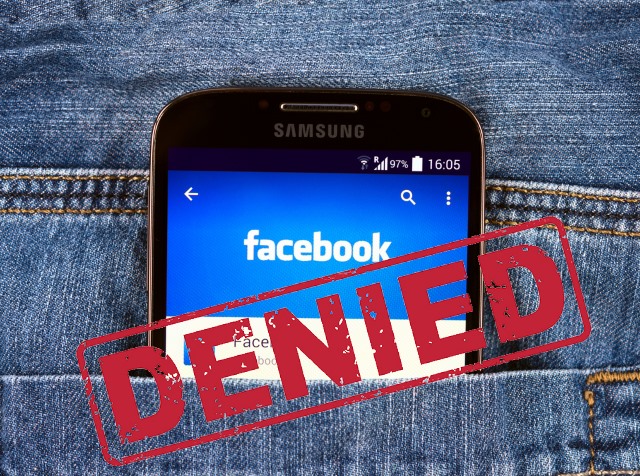
Facebook hits back at Israeli complaints about sabotaging police work
Facebook has responded to complaints from Israel's Minister of Internal Security saying that it does remove abusive content from the site. On Saturday, Israeli cabinet minister Gilad Erdan referred to Facebook as a 'monster' adding that it "does not cooperate" with requests from the police.
Tensions between Palestine and Israel have seen an increase in posts inciting violence and terrorism. While Erdan accuses Facebook of failing to step in as well as "set[ting] a very high bar for removing inciteful content", the social network says it work closely with numerous countries, including Israel, to stem the flow of hate speech.

Report: YouTube and Facebook are now using automated tools to remove extremist content
With the likes of ISIS understanding the power of social media, Facebook and other online services find themselves under increasing pressure to counter terrorist and other extremist content. A report by Reuters says that a number of online companies are using automated tools to remove videos that violate terms of use.
Such tools have previously been used to prevent the spread of copyright videos online, but now it seems that they have been put to a new task. While automation can do little, if anything, to prevent the initial appearance of extremist videos, social networks can use them to stem the flow of republishing.

Protests from Apple and Microsoft mean there won't be a rifle emoji
With the unstoppable growth of chat apps such as Facebook Messenger, WhatsApp and the like, emoji have become an incredible phenomenon. The Unicode Consortium is due to publish the Unicode 9.0 spec tomorrow, and it seems that objections from Apple and Microsoft means we're not going to see a rifle emoji included.
The intervention is slightly surprising, yet not entirely unexpected. With the large number of high-profile mass-shootings such as in Orlando, debate about guns has come to the fore once again and the censorship of emoji is perhaps not completely unexpected. But at the same time, there is already a pistol emoji and there are not -- yet -- calls for it to be removed.

Microsoft, Google and Facebook to work with Bangladesh government to remove 'inappropriate content'
Following prolonged talks with the Bangladesh government, Facebook, Google and Microsoft have all agreed to do more to remove 'inappropriate content' from the internet. State Minister for Telecoms, Tarana Halim, said: "After intense discussion with Facebook, Google and Microsoft, it has been agreed that they will respond to requests within 48 hours".
Agreeing to the Bangladesh government's demands comes just weeks after major tech companies agreed to a new code of conduct to combat online hate speech. In this instance, however, it has not been made entirely clear what constitutes inappropriate content, and the announcement will raise questions about the tech trio bowing to governmental demands.

Google explains that search autocomplete censors suggestions
If you use Google as your search engine, you'll no doubt have noticed that as you type, a list of suggestions appears. This is an example of Google trying to be helpful, but the autocomplete suggestions can also be amusing or just plain weird -- thanks, algorithms! In recent days, Google has been accused of tinkering with search suggestions in a way that favors Hillary Clinton -- something the company strenuously denies.
You may have wondered how Google comes up with the suggestions it makes, and Tamar Yehoshua, VP of product management has spilled the beans. She reveals that as well as trying to be helpful to the searcher, the autocomplete algorithm also censors suggestions to discourage people from conducting "offensive or disparaging" searches about others.

Facebook, Twitter, YouTube and Microsoft will fight online hate speech in Europe
Facebook, Twitter, YouTube and Microsoft are working in conjunction with the European Commission to try to tackle the problem of illegal online hate speech. This is something that the companies have taken steps to fight individually, but now there is a concerted effort to combat hate speech and terrorist propaganda in Europe.
New EU regulations require the companies to review notifications they receive about hate speech within 24 hours. The four tech giants have agreed to the new code of conduct, saying the 'majority' of reported content will be examined within a day.

Messaging apps need to play by Iran's rules to operate in the country
Privacy concerns have been voiced after Iran announced plans to force messaging apps and social media services to store all data about Iranian users on Iranian soil. It is common practice for user data to be stored in other counties, but the government in Iran continues to exert its authority over the internet.
Any company who wants to operate a message service in Iran has a year to comply with the data relocation requirement. With Iran already blocking access to the likes of Facebook and Twitter, privacy and security advocates have expressed worries about the implications of the new rules.

Facebook to update Trending Topics despite denying bias
After an investigation into Trending Topics, Facebook has concluded that there is no evidence of a liberal bias to the news that appears. Mark Zuckerberg met with key conservatives following accusations that the social network was censoring right wing news.
Despite finding 'virtually identical' numbers of conservative and liberal news, Facebook says that it will still make changes to the way Trending Topics work. It says that it is difficult to exclude the possibility of 'unintentional bias' but hopes to improve things by retraining its reviewers and ditching the current reliance on a list of news outlets as sources.

Microsoft updates policies to tackle terrorism on the internet
Microsoft has outlined its latest plans to crack down on terrorist and extremist content online. Recognizing that the "internet can be used for the worst reasons imaginable" the company has set out its approach for ensuring that content promoting terrorism does not make it online through its services.
As well as updating its terms of use to make it explicitly clear that terrorist content is not permitted, Microsoft is also planning to up its game in seeking out and removing offending content. To help with this task, the company is forging new partnerships with experts in the field, as well as employing new technology to help to automatically identify and remove terrorist material.

Celebrity threesome injunction sees Twitter send warning emails to those who name PJS and YMA online
People who have named the celebrities known by the initials PJS and YMA have received warning emails from Twitter.
A superinjuntion is in place that prevents the naming of the couple, one of whom is said to have been involved in a threesome with two other people known as AB and CD.

Chinese government manipulates social media with nearly half a billion fake posts per year
China's control over access to the internet is hardly a secret, but the government is not just interested in using the famous Great Firewall of China to limit what its citizens can see. State monitoring of internet usage is very common, and the government also has a propaganda machine in place, manipulating the country via the web.
A new study by researchers at Harvard University suggests that governmental interference online could be even more prolific than first thought. Social media has been infiltrated and is believed to have been taken over by paid trolls whose job it is to inject pro-government, pro-regime, pro-Communist Party posts disguised as genuine content from regular citizens.

Facebook denies censoring right wing news from Trending Topics
Having been hit with allegations of censoring news from conservative outlets, Facebook has issued a strenuous denial. Gizmodo reported claims from former Facebook "news curators" that they were directed to not only suppress news from right wing sources, but also to "inject" stories into Trending Topics regardless of their actual popularity.
Suggestions that its Trending Topics are driven by a liberal agenda have been denied by Facebook. The social network says it "found no evidence that the anonymous allegations are true", going on to say that while there is a review team in place, its guidelines "do [not] permit the prioritization of one viewpoint over another or one news outlet over another".

Google refuses to censor search results that identify PJS and YMA
There's nothing like a good sex scandal to get people talking, and that's certainly what's happened in the case of a celebrity threesome that's currently subject to a superinjunction banning the involved parties from being named. While the identities of the couple cannot be revealed by British newspapers, their names are well-known in other parts of the world, and all over the web.
The British press has played ball, agreeing not to name YMA, his husband PJS and the two others, AB and CD with whom a threesome is supposed to have taken place but it is impossible for law enforcement agencies to control what appears online. Google has been the first port of call for many curious-minded people eager to learn the names of those involved, and the search giant has said that -- despite many requests to do so -- it will not censor search results that could lead people to the names.

Women and black writers are the biggest victims of abusive online comments
Online abuse is a serious problem. While the likes of Twitter and Facebook are great platforms for trolls to indulge their hobby, it's the good, old-fashioned comments section where you'll find some of the most obvious examples of threats and abuse. The problem is so great that many websites have taken the seemingly drastic step of completely disabling comments on stories, while others do so on an individual basis for articles that could prove controversial.
Clearly this is less than ideal. In many ways it could be viewed as a form of censorship that curtails freedom of speech, and comments can be a valuable way to help a story to evolve. For many sites, comments are a black and white topic; on or off. Moderation -- again, often seen as a type of censorship -- is often employed, but this does little to stop abuse aimed at writers. The Guardian has conducted research into the abuse dealt out via comments on its site, and the findings make for disturbing reading.

Porn site xHamster bans North Carolina users in protest against anti-LGBT laws
North Carolina's decision to pass House Bill 2 -- which effectively block measures to protect LGBT people -- means that residents of the state are no longer able to access a popular porn site. Just as Bruce Springsteen decided to show his disgust at the new legislation by cancelling a concert in North Carolina, so xHamster has taken the step of blocking North Carolina porn consumers from accessing the site.
North Carolina's new law prevents local governments from passing anti-discrimination rules to protect lesbian, gay, bisexual and transgender people, and it is sending ripples of disgust through the equal rights movement. With xHamster's involvement, the fight against the legislation has been taken online, hitting state residents where it hurts in a bid to encourage people to sign a petition against the bill.
